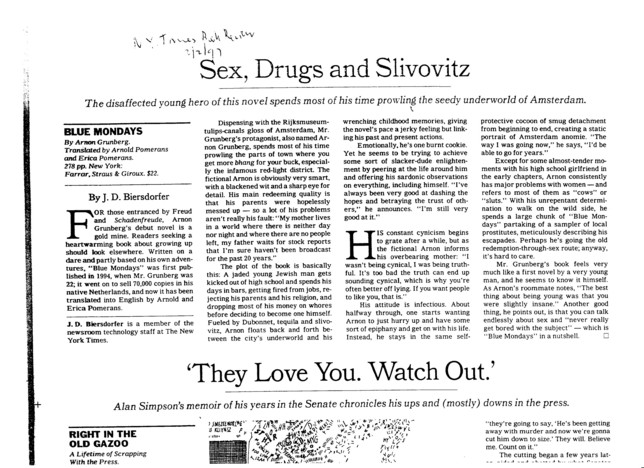Sex, Drugs and Slivovitz
J.D. Biersdorfer
For those entranced by Freud and Schadenfreude, Arnon Grunberg's debut novel is a gold mine. Readers seeking a heartwarming book about growing up should look elsewhere. Written on a dare and partly based on his own adventures, "Blue Mondays" was first published in 1994, when Mr. Grunberg was 22; it went on to sell 70,000 copies in his native Netherlands, and now it has been translated into English by Arnold and Erica Pomerans.
Dispensing with the Rijksmuseum-tulips-canals gloss of Amsterdam, Mr. Grunberg's protagonist, also named Arnon Grunberg, spends most of his time prowling the parts of town where you get more bhang for your buck, especially the infamous red-light district. The fictional Arnon is obviously very smart, with a blackened wit and a sharp eye for detail. His main redeeming quality is that his parents were hopelessly messed up -- so a lot of his problems aren't really his fault: "My mother lives in a world where there is neither day nor night and where there are no people left, my father waits for stock reports that I'm sure haven't been broadcast for the past 20 years."
The plot of the book is basically this: A jaded young Jewish man gets kicked out of high school and spends his days in bars, getting fired from jobs, rejecting his parents and his religion, and dropping most of his money on whores before deciding to become one himself. Fueled by Dubonnet, tequila and slivovitz, Arnon floats back and forth between the city's underworld and his wrenching childhood memories, giving the novel's pace a jerky feeling but linking his past and present actions.
Emotionally, he's one burnt cookie. Yet he seems to be trying to achieve some sort of slacker-dude enlightenment by peering at the life around him and offering his sardonic observations on everything, including himself. "I've always been very good at dashing the hopes and betraying the trust of others," he announces. "I'm still very good at it."
His constant cynicism begins to grate after a while, but as the fictional Arnon informs his overbearing mother: "I wasn't being cynical, I was being truthful. It's too bad the truth can end up sounding cynical, which is why you're often better off lying. If you want people to like you, that is."
His attitude is infectious. About halfway through, one starts wanting Arnon to just hurry up and have some sort of epiphany and get on with his life. Instead, he stays in the same self-protective cocoon of smug detachment from beginning to end, creating a static portrait of Amsterdam anomie. "The way I was going now," he says, "I'd be able to go for years."
Except for some almost-tender moments with his high school girlfriend in the early chapters, Arnon consistently has major problems with women -- and refers to most of them as "cows" or "sluts." With his unrepentant determination to walk on the wild side, he spends a large chunk of "Blue Mondays" partaking of a sampler of local prostitutes, meticulously describing his escapades. Perhaps he's going the old redemption-through-sex route; anyway, it's hard to care.
Mr. Grunberg's book feels very much like a first novel by a very young man, and he seems to know it himself. As Arnon's roommate notes, "The best thing about being young was that you were slightly insane." Another good thing, he points out, is that you can talk endlessly about sex and "never really get bored with the subject" -- which is "Blue Mondays" in a nutshell.
